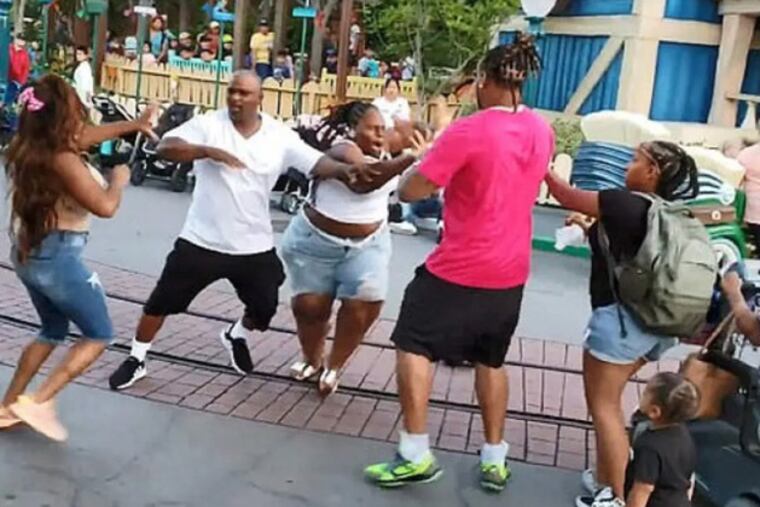‘Was he black?’ The first thing I ask when I hear about a crime | Solomon Jones
Solomon Jones: Feeling responsible for the bad acts of strangers is not normal. But for myself and many other black people, it is often the reality.

When video emerged of a black family fighting at Disneyland, I felt personally embarrassed, just as I did while viewing news coverage of 10 African Americans rushing into a store in Pleasant Prairie, Wis., to steal $30,000 worth of North Face gear.
This feeling of embarrassment is not a new reaction for me. In the years before stories were accompanied by video, I often found myself responding to news about heinous crimes with a single question about the perpetrator: Was he black?
Feeling responsible for the bad acts of strangers is not normal. But for myself and many other black people, it is often the reality. Some within the black community have told me we respond that way because we have a special connection to one another. Perhaps that’s true, but there’s a simpler explanation. I think black people feel as if we’re accountable for the actions of other blacks because we’ve internalized the effects of racism.
It’s a kind of defense mechanism, says psychologist Dan Collins, who holds a Ph.D. in philosophy. The American tendency to view blacks as a monolith makes “some people feel like they have to defend the whole race because of what others do.”
That struck a chord with me. Because as a black man in America, I always feel as if I have something to prove. I have to prove I’m as smart as everyone else, or as ethical as everyone else, or as trustworthy as everyone else. But then there’s the extra burden of trying to prove what I’m not.
I’m not a member of the family in Disneyland who engaged in a violent fracas. I’m not the group in Wisconsin that stole $30,000 worth of clothing in 30 seconds. I’m not one of the gunmen who terrorize communities of color.
But trying to knock down stereotypes is a losing battle, Collins said. “We’re trying to disprove a negative. As a lawyer would say, it’s impossible to disprove a negative.”
Yet black people continue to feel responsible for the bad acts of other people, simply because they share the same skin color.
“I think that whole phenomenon is because of racism,” said lawyer and critical race theorist Tim Golden. “Racism has a way of denying a group’s particularity. It doesn’t take individuality into account. Racism says when a white person sees a black person do something out of bounds or illegal, it becomes a way of imputing ill will to the entire group without any consideration of the individual members of that group.”
Golden, now a professor of philosophy at Walla Walla University, practiced law in Philadelphia and in the federal courts for two decades, and he’s seen how race and racism play out in the law.
“In law what makes racism operate so successfully is that law and legal theory tend toward the abstract,” Golden told me. “It tends to not look at people as individuals, but as abstract entities that have rights. They become abstract persons apart from their unique history and circumstances.”
That same kind of abstract viewpoint is what black people fight against every day. We live in a society that views individual bad acts as defining characteristics for all of us, but individual achievements as exceptions to the rule.
In all of this, the unique histories and circumstances of individual black people are ignored.
Golden, who lectures often on the topic, starts his lectures with a story that illustrates the point.
“[It’s the] hypothetical story of a little boy named Billy who has a heart problem,” he told me. “And he plays on the soccer team. The doctor tells the coach that any overexertion could be fatal. One day the team has a bad practice and the coach makes everybody on the team run extra laps after practice. Billy collapses and he dies. The reason why he died was that the coach ignored his history. The coach, in trying to treat everybody the same, failed to treat everybody fairly. …
“When you ignore history,” Golden said, “people die.”
Perhaps that’s the lesson in this.
When America ignores the history of racism, people die. Black people often physically die. Racists die morally because they refuse to admit their hatred. And others die spiritually because they refuse to confront that hate.
In the meantime, that same racism pushes black people to ask a single question about the perpetrator of every crime: Was he black?
Solomon Jones is the author of 10 books. Listen to him weekdays 7 a.m. to 10 on 900 AM/ 96.1 FM WURD.